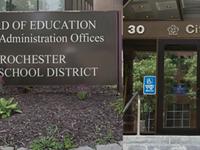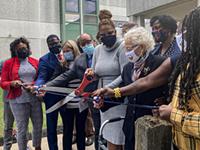[
{
"name": "500x250 Ad",
"insertPoint": "5",
"component": "15667920",
"parentWrapperClass": "",
"requiredCountToDisplay": "1"
}
]
No one can accuse Rochester schools Superintendent Barbara Deane-Williams of being a media hound. Since the school board hired her last summer, she's had relatively little to say to reporters.
She decided instead to embark on a months-long mission: an intense study of the district. Her listening tour involved dozens of meetings with teachers, administrators, parents, and community leaders. She has spent time in every school. She has gone to churches on Sunday mornings.
"I was curious about why we find ourselves in Rochester with the lowest performance in New York State," she says. Despite some strong initiatives and leaders over the years, "we continue to find ourselves in the same position."
It's a blunt assessment, one that's been voiced by many people familiar with the school district, including a lengthy list of Deane-Williams' predecessors.
To her credit, Deane-Williams didn't arrive making grand pronouncements about how she plans to fix Rochester's schools. Nor has she made any promises about where graduation rates will be at the end of her three-year contract. (They're currently hovering just above 50 percent.)
That's just as well; many parents, teachers, and community leaders have heard promises about those things before. And many people, including some in City Hall, are not just skeptical; they've become hardened non-believers.
School board members, for the first time in years, all seem to agree that they picked a winner in Deane-Williams. And Rochester Teachers Association President Adam Urbanski is optimistic, too. (It may help that Deane-Williams' budget proposal for next year calls for an ambitious increase in reading and special education teachers.)
It's obvious within minutes of meeting Deane-Williams that she's an astute and highly experienced school leader. And her slightly nasal Rochester-A is a giveaway that she's from the area. She grew up in Honeoye Falls and was superintendent of the Greece school district for four years before becoming a deputy superintendent with the Boston school district.
She has a reputation for being nurturing but tough. Asked in an interview last week what she learned during her months of assessing the district, she focused sharply on one particular area: the deeply entrenched bureaucracy. The district is laden with systems that operate almost unrelated to one another, she said, and the gears in this mammoth machine don't always line up.
"The thing that I found most striking is that we weren't set up in the district's central office to help schools improve," she said. "In some cases, we have unintentionally created barriers to services and responsiveness."
A simple example: Some principals are so inundated with emails from central office every day that they can't prioritize the information in them, she said. Demands for immediate action from the budget office, for instance, may arrive at the same time as an equally urgent request from the special education office.
And it hasn't helped that for about a decade, the district has been in a state of near constant flux at the top of the organization. Initiatives to improve student performance begun under one superintendent have often been discontinued under the next. Parents and students have complained about the instability they experience.
Another problem: For years, the district has waited until August to start hiring new teachers for the coming school year – virtually the last instance – sometimes losing good candidates because of the uncertainty. Deane-Williams has already started filling expected vacancies for next year.
Also on Deane-Williams' list: Rochester schools need to do a better job of responding to children's needs. The district has been emphasizing the importance of having children reading at grade level by third grade, but it hasn't done enough to help them before they get to third grade, she said. When children fail the first big test, the district needs to double down with support until they can pass it, she said: "You interrupt failure."
And while reading proficiency by third grade is important, city schools get new students in every grade throughout the year. "You better have really good programs in fourth, fifth, and sixth," Deane-Williams said. "We don't know when a kid is going to enter our system. We have kids entering our system all the time from other countries, cities, and towns."
The district has emphasized the need to improve student attendance. And while it's true that many students fall behind because of poor attendance, many with good attendance records still can't read at grade level.
The district has debated whether seventh and eighth grades should be located in elementary schools, middle schools, or high schools. More important, said Deane-Williams, is having teachers who know how to work with children that age – and who want to work with them.
"I'm of the belief that there's not a single thing or two that are going to get us to the performance level we desire," she said. Reading by third grade is important, she said, "but it's also about math, it's about science, writing, music, and art."
And, she said, the district will need wide community involvement and support.
There's a note of protectiveness in Deane-Williams' voice when she talks about the complexity of urban school systems and how the public and even some in the district don't appreciate its impact. She's sensitive about the generally negative news coverage the district receives, while many positive achievements go unnoticed, she said. And she said she is convinced that the public is ready to help.
But she and the district are under enormous pressure. She still has to close a nearly $18 million gap in her proposed budget for the coming school year. She's already asked Albany for additional funding, but if she doesn't get it, it's not clear what her next steps will be.
She's working on creating another college partnership, this time for students with disabilities. But she has to find funding for it.
She says the faith community and other groups say they're ready to help with things like tutoring. But the volunteer commitments will have to be long-lasting. And schools will need to be better organized to use that volunteer support.
She emphasizes the need for efforts to help children starting at birth, and for stronger early-education programs, but some of her predecessors have made the same point. Public support and funding hasn't materialized.
There's a lot hanging on Deane-Williams' leadership. Is she "the one," as some people have referred to her – the superintendent who can finally turn the Rochester school district around? Certainly many people want her to be, and in the background, you hear people say, 'Oh, my god: what if she isn't?'
But she hasn't been on the job for even a year. It's far too early to predict how successful she'll be. And more important, Deane-Williams isn't the sole solution to the Rochester school district's problems. No individual superintendent can be, and it isn't fair to expect them to be.
Speaking of...
Latest in News
More by Tim Louis Macaluso
-

RCSD financial crisis builds
Sep 23, 2019 -

RCSD facing spending concerns
Sep 20, 2019 -

Education forum tomorrow night for downtown residents
Sep 17, 2019 - More »









